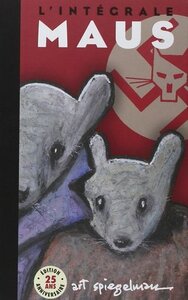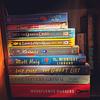Take a photo of a barcode or cover
dark
emotional
reflective
tense
fast-paced
What's surprising about this book is the fact that it is more than an account of a survivor's experience in Auschwitz; it is also about the artist's relationship with his father and the artist coming to terms with the lasting affects of the Holocaust. A great and difficult book
dark
emotional
informative
medium-paced
challenging
dark
emotional
reflective
tense
fast-paced
dark
emotional
funny
reflective
tense
medium-paced
dark
emotional
sad
tense
medium-paced
Really good! Haven’t ever read a graphic novel and it was fascinating to see this heavy topic handled in this way. I appreciated how the author included the thread of his own relationship with his dad as part of the story. It showed how the war and the horrific experiences had impacted his parents years later.
Definitely recommend.
Definitely recommend.
challenging
dark
emotional
informative
reflective
sad
tense
medium-paced
dark
emotional
sad
medium-paced
A deeply moving personal narrative about the holocaust and survivorship beyond it. What really makes Maus a cut above is the way this novel weaves the past narrative with present framing, aware of the subjectivity of one single survivor's narrative, told in snippets and tape recordings from a crotchety old man who skips ahead, mixes details, who is as prone to forget as any of us. This is not simply a personal account of genocide, but it a sense of how atrocities shape the people who survive them and how that atrocity becomes part of not just a personal but a family history that still bleeds into the present. Was Vladek always mean, judgemental, a difficult person to be around? Why did Anja commit suicide? Maus poses these questions but it doesn't give you straight or easy answers. It doesn't let Vladek's portrait stand as 'definitive' either -- as you read, you're aware of all the missing stories here, those from Jewish people who weren't so lucky, who weren't able to speak multiple languages or bribe the guards or miss a gunshot aimed at them by a hair, who simply died and whose stories may or may not be known, as well as the sense that even within this single family, there's the shadow of the mother's story untold - her diaries burned, her history lost - cast over this narrative. In one man's story you see the holes of how much is missing from others, and then you look at this 'lucky' survivor and see the sort of man he became... it's devastating, really. Maus doesn't contain the holocaust to 1940s Poland, but shows how this genocide has impacted this family, and continues to shape our present.







